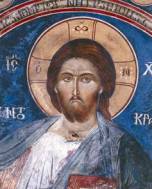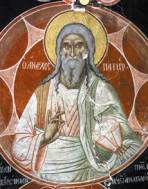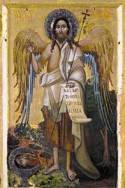|
HOME
ABOUT
TITLES
ORDER
E-MAIL
|
Dionysios
of Fourna (c.
1670-c.
1745)
Artistic
Creation and Literary Description
by
George
Kakavas
Dionysios of Fourna is very well known as author of the Hermeneia,
a painterís manual, but less recognised for his artistic activities. George
Kakavas aims in this publication
to demonstrate the significance of Dionysios not only as author but also
as artist. He uses manuscript evidence and extant paintings on
Mount Athos and at Fourna, and evaluates the artistic and literary works
of Dionysios by gathering biographical evidence from documentary sources
such as his correspondence, inscriptions, epigrams, liturgical works and
his Vita composed by Theophanis
of Agrapha. He also investigates
the connections between the painted and written works of Dionysios. A
paradox of Dionysiosí artistic oeuvre
is that it includes iconographic elements that had entered into
post-Byzantine art, regardless of whether these are recorded in his Hermeneia
or not. In conclusion, his
artistic legacy is of equal value to his literary one and by examining
both it has been possible to arrive at a fuller understanding of Dionysios
as author and painter.
This
book is based on the authorís PhD gotten at the Courtauld Institute of
Art, University of London. The author (b. 1957) previously studied History
and Archaeology at the University of Athens; he also holds a BA degree in
Theology from the same University. He worked for many years as a Field
Archaeologist and Curator of Antiquities for the Greek Ministry of Culture
and as a Research Associate for the Christian and Archaeological Society,
and the University of Athens, Department of History and Archaeology; he is
currently director of the 24th
Ephorate of Byzantine Antiquities at Lamia. He lectured
and published extensively on key issues of Byzantine and post-Byzantine
painting, while his research interests also include the study of Byzantine
fortification systems, as well as post-Byzantine Architecture, mainly of
the 17th and the 18th centuries. He also supervised
the organization of major Byzantine and post-Byzantine Exhibitions
worldwide and, subsequently, edited the accompanying catalogues or
contributed to them with numerous entries on a wide range of material.
C0NTENTS:
Preface, Introduction (A note to the sources, A note to the appendices).
Chapter One (The editions and translations of the Hermeneia of Dionysios
of Fourna, The purpose of Dionysiosí Hermeneia, The contents and
the sources of the Hermeneia, The Hermeneia as a continuum between
past and current practice: the blank pages, The dating and the likely site
of the Hermeneiaís completion, Hermeneia and Hermeneiai:
the eventual predominance of Dionysiosí Hermeneia). Chapter Two
(The vita of Dionysios of Fourna). Chapter Three (From literary
description to artistic creation and vice versa, The artistic
strategy of Dionysios of Fourna). Conclusions. Appendix I (The codex of
the Zoodochos Pigi Monastery at Fourna: Codex Benaki 37). Appendix II (The
cell complex of Dionysios of Fourna at Karyes on Mount Athos). Appendix
III (Catalogue of painted works of Dionysios of Fourna). Appendix IV (List
of the Hermeneia and Hermeneiai manuscripts). Index, List of
Abbreviations, Bibliography, List of Illustrations.
Most
of the material is published here for the first time.
Bound,
24 x 17 cm., 552 pp. (368 pp. text, 230 illustrations in
full colour and 100 in black and white)
2008
ISBN: 9789080647688
PRICE: EUR 250
Dionysios
of Fourna, Chapel of Timios Prodromos, Karyes, Mount Athos, 1711 A.D.
|
Christ Pantokrator, Wall painting
|
The
Eternal Father, Wall painting
|
Icon
of St. John the Baptist
|
|
|



